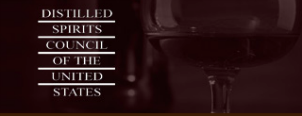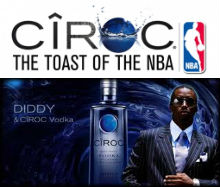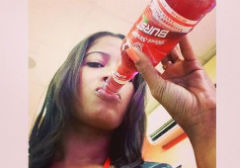In the Doghouse
Doghouse: DISCUS PR Spin: Same Tune, Different Verse
January 8, 2014
 |
The Distilled Spirits Council of the United States (DISCUS) is at it again. In a recent press release, the industry trade group cited the continuing (though small) decline in underage binge drinking. DISCUS President Peter Cressy then credited the industry for the decline, slamming public health advocates and researchers who dare to suggest that the (remaining and costly) problem of alcohol-related harm actually stems from those who make and market alcohol, and who advocate for policies restricting access and exposure for youth.
Mr. Cressy finds himself in disagreement with the scientific community when it comes to evidence-based alcohol policy. A new study by Boston University’s School of Public Health, published in the peer-reviewed American Journal of Preventive Medicine, finds a strong link between effective population-based alcohol policies and significantly lower binge drinking rates. And yes, the most effective policies cited in the study--state monopoly on wholesale and retail sales; wholesale and retail price restrictions; higher beer taxes; and restrictions on outlet density—are the very same policies that Cressy describes as unfounded.
Of course, the alcohol industry and its trade groups prefer policies that make the companies look good, allowing them to continue their unregulated marketing tactics without reducing alcohol-related harm or consumption. That’s the purpose of the Century Council, an organization comprised of the same spirits producers as DISCUS: to promote policies that punish individuals for drinking problems, while ensuring the industry is not held accountable. The Century Council's latest celebrity ambassadors, Shaquille O’Neal and teen pop star Bella Thorne, are mouthpieces used to up the coolness factor of iDecide, an informational campaign that “focuses the importance of formulating and following individual decisions.” By steering the focus toward individual accountability, the industry successfully avoids being subjected to evidence-based, population-level regulatory policies that would require companies to find ways to make money without causing harm.
DISCUS members continue to avoid regulation of alcohol marketing as well, with industry's voluntary codes that allow overexposure of youth to alcohol advertising and harmful content. CAMY’s recent review of 1,800 magazine ads found them rife with inappropriate sexual content, misleading health claims, and high-risk consumption. Because the codes are voluntary, there is no real oversight--only a complaint from the public about a specific advertisement precipitates a review. The DISCUS Code Review Board, made up of industry executives, reviewed just two ads in violation of their lenient code in all of 2013. If the board finds in agreement with a complaint, the advertisement may be simply removed with no consequences to the producer, who has already benefited from the exposure and potential notoriety from the violating ad.
This was the case with the recent Dewar’s “Meet the Baron” advertisements, which sparked public questions and complaints of particularly sexist content last month. Dewar's owner Bacardi pulled the ad after whiskey bloggers, an online petition, a social media storm, and a public question regarding the DISCUS advertising code prompted DISCUS review #2 for 2013. A week after the ads (and related social media) were pulled, DISCUS ordered the Dewar's ads removed - and then trumpeted the supposed efficacy of the review system. Meanwhile, thousands of sexist alcohol ads from a variety of companies, in all media formats, remain available to the public.
That’s what makes the alcohol industry's self-regulation facade so successful. This is all business as usual for DISCUS, but how long can these companies get away with it? At some point, someone on the inside will have to stop the endless spin, and see that profits should not be made at the expense of the public's health and safety.
| DISCUS MEMBER COMPANIES: | CENTURY COUNCIL MEMBER COMPANIES: |
|
|
In the Doghouse: Diageo, Diddy, and the NBA Peddle Vodka to Youth
December 11, 2013
 |
Diageo, Sean (Diddy) Combs, and the NBA want to ensure that the NBA fan experience includes drinking plenty of Ciroc and Crown Royal. Diddy and Diageo's new sponsored programming deal names the brands the new Toast of the NBA, and will make it virtually impossible to engage in an NBA game or media event without being exposed to the alcohol promotion. Diageo's VP-PR Dan Sanborn proudly describes the strategy as a way of inserting the brand into a notion of event celebration, and as a direct connection to the drink. Diageo's partnership with Diddy is particularly insidious, targeting youth of color by appealing to the NBA's young audience and hip-hop culture.
Alcohol is the #1 drug of choice among America's youth. Many youth grow up with NBA stars as role models, and NBA teams actively recruit them as lifelong fans with youth programs and merchandising. The more that young people are exposed to alcohol advertising, the earlier they start drinking, the more they drink, and the more alcohol-related harm they experience. Drowning the youth demographic with alcohol promotion while actively pursuing their brand loyalty, presumably for a later date when they are 21+, is irresponsible. All fans, particularly youth, deserve to enjoy the game without being assaulted by relentless promotion of this harmful product.
In the Doghouse: Diageo Admits Targeting 18-24 Year Olds With Red Stripe Alcopop
November 19, 2013
 |
With an honesty rarely seen among alcohol producers, Diageo’s Red Stripe brand manager stated that a new raspberry-flavored malt beverage (FMB) is a “recruitment-driven” product designated primarily for 18-24 year old females.
Red Stripe Burst, a Jamaican brand, is owned by London-based global booze behemoth Diageo (producer of Smirnoff Ice). A November 6 Gleaner article entitled “Red Stripe Creates Raspberry Beer for Young Drinkers” included a statement by Ms. Mitchell: “We hope it has crossover appeal,” suggesting the pink and red labels and raspberry beer flavor has already been tested to appeal to young women. According to the article, the decision to distribute the product line in the U.S., Canada, and the UK will be made by Red Stripe executives in those countries.
“It’s clear now that Diageo tests alcopop beverages on 18-24 year old cohorts of young women and men in other countries before marketing them in places like the United States where the drinking age is appropriately higher,” said Bruce Lee Livingston, Executive Director / CEO of Alcohol Justice. “Alcopops were designed as cocktails on training wheels, sweet and fruity, to lure underage youth into unhealthy drinking behaviors, especially girls. Now we have written proof that Diageo is leading the charge in a race to the bottom of the alcopop barrel to endanger youth.”
More Articles ...
Help us hold Big Alcohol accountable for the harm its products cause.
| GET ACTION ALERTS AND eNEWS |
STAY CONNECTED    |
CONTACT US 24 Belvedere St. San Rafael, CA 94901 415-456-5692 |
SUPPORT US Terms of Service & Privacy Policy |


